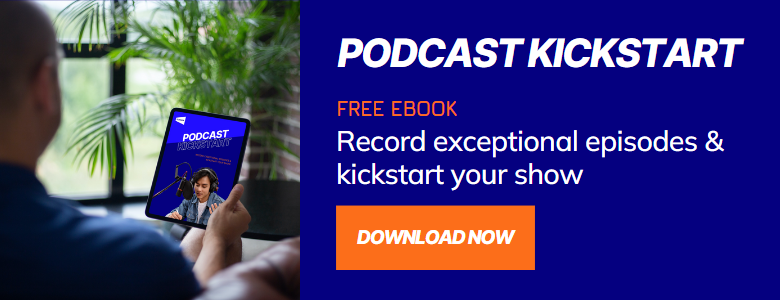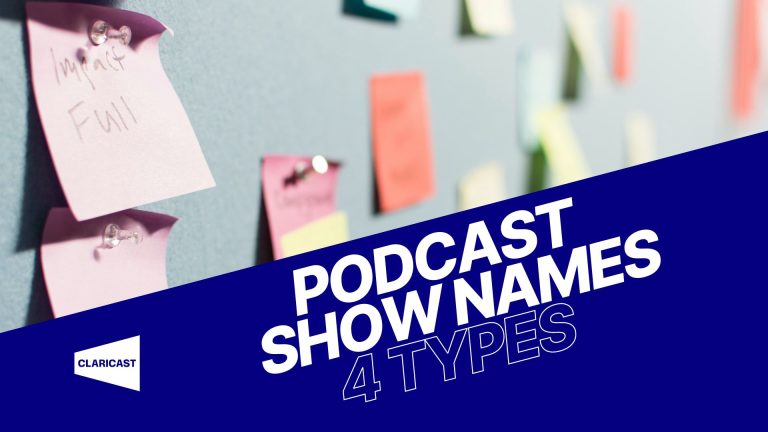Do you struggle to stick to your podcast schedule? Are there some weeks when skipping an episode or two feels like the only option?
We know that the most effective way to grow your podcast and get more listeners is to create quality and consistent content.
But to create consistent content, you need a podcast schedule that you can stick to. If you’re not sticking to your schedule and are missing episodes here and there, it’ll likely be more difficult for you to reach that exponential growth stage and maintain it.
Here are three reasons why staying consistent helps you grow –
- Your listeners are more likely to stick around and get to know, like and trust you
- The algorithm that promotes your podcast to new listeners will be more likely to work in your favour
- Sticking to your podcast schedule will keep you motivated and you’ll be less likely to ‘podfade’
But I know how difficult it can be when you’re juggling your podcast around other parts of your business/life. This is why I’ve put together these 7 tips on how to stick to your podcast schedule. I hope that they help you to stay on top of things and lose some of the stress!
1. Pick a Realistic Schedule
Before you even launch your first episode, consider what a realistic schedule that you’ll be comfortable with looks like. It’s no good picking a ‘two-per-week’ schedule simply because you feel you should be releasing twice weekly. Or because at the moment you know you’ll manage.
Consider how much time an episode takes you to plan, record, edit and release. Let’s call it 6 hours for argument’s sake. And perhaps an extra hour for promoting each episode. When will you be able to fit those hours in? Do you typically allot Friday mornings for creating content? Or perhaps you’re willing to dedicate your Saturdays to your podcast.

If you can’t be sure that you’ll have this time available on a typical week, you could find yourself getting snowed under and missing weeks.
On the other hand, it is important to upload regularly. So be sure to choose a schedule that you’ll have the time for, and that keeps your listeners locked in.
2. Keep an Up To Date Podcast Editorial Calendar
Once you’ve decided on a podcast schedule, get it typed up. Preferably in a calendar like Google Calendar, a project management app like Trello or a notation app like Notion. But even a spreadsheet is better than nothing!
Keeping the schedule in your head or on a scrap of paper in your desk drawer is a recipe for failure. Each episode that you’re planning should have an entry in your editorial calendar with any key information including –
- Episode number and name
- Release date and production deadline
- Guest details
- Episode outline/script
- Anything else appropriate to your podcast
If you’re using a project manager with a kanban system, you can move episodes through the stages as you complete them. If you’re using a calendar or notation app, you can make use of checklists and notes to tick off stages for each episode.

I suggest filling up your calendar several months into the future, even if you don’t have all the plans in place for every episode. It’ll help keep you motivated and accountable.
3. Outsource What You Can
Earlier on I asked you how long it takes for you to plan, record, edit and release an episode. Perhaps you’d like to stick to a weekly schedule, and you know that it’d be the best option for growing your show. But you just don’t have those 6-7 hours to spare each week.
Make a list of all of the podcasting activities that you do each week. Which ones truly require you to be doing the work?
You’ll likely be planning the episodes and conducting the interviews yourself. But what about the rest of those hours? The editing, the mastering (prepping audio files for upload), the uploading and creating the companion content. All of this can be outsourced to podcasting experts who will be able to able to match your style (if they know their stuff). And you’ll benefit from getting a professional result.
There is a cost involved in this of course. But if you want to ensure you’re getting the best result and you’re struggling to stick to your podcast schedule, outsourcing may be the way to go.
4. Consider Your Working Style
Are you a Batcher? Or are you a Streamer? I’ve pulled these terms from the two main methods of data processing – batch processing and stream processing. But it makes sense for content creation too.
Are you a Batcher?
A Batcher prefers to allocate a big chunk of time to one task. Scheduling a month’s worth of social media posts in one go, for example. And batch-cooking lunch for the whole week ahead (this week it’s stew for me).

In podcasting terms, a Batcher might be better off spending 2 or 3 days a month producing and scheduling all of the following month’s episodes.
Or are you a Streamer?
A Streamer prefers to work on things in small chunks. Only writing up tomorrow’s social posts. And making lunch every morning.
A streamer would prefer to work on a single episode each week, completing an episode in full before moving on to the next episode.
–
Which sounds more like you? Do you get bored when batching? Or maybe you find it hard to focus when only working in small chunks. Or perhaps you’re versatile and are happy to take either approach depending on the situation.
Whatever your working style is, run your podcast in the way that you’re most comfortable. Forcing yourself to batch produce episodes when it just doesn’t come naturally to you could result in rushed work and poorer results. Whereas if you prefer the batching approach, you could benefit from getting everything done in just a couple of days and having one less thing on your plate.
5. Work In Advance
There are few things more stressful than constantly being at the end of a deadline. And this is what a lot of podcasters are dealing with. It causes stress and leads to missed episodes. And we don’t want to be stressed-out podcasters!
Do what you can to avoid working week to week on your podcast. The podcast that you’re working on this week, shouldn’t be the one being released this week. Or even next week, ideally. As a rule of thumb, I suggest working at least two weeks in advance.
This way, if life does get in the way one week, it’s no sweat. You also won’t be in a constant state of panic trying to keep up with your podcast schedule. And finally, if your podcast relies on other people, like an editor or compliance officer, you’ll have plenty of turnaround time.
There are some podcasts that this wouldn’t work for – current events and news shows, for example. Have a think about what you can do with your podcast schedule that’ll keep you ahead.
6. Use Automation
This one follows on from my outsourcing tip. Of all the podcasting activities that you can’t outsource, which ones can you automate?
Take another look at your list of podcasting activities (whether you wrote one down or you have a mental list). Let’s say you’ve outsourced your editing and everything else is down to you.
Which of these remaining activities could be sped up by using a system or app?

Are you manually arranging timeslots and scheduling Zoom calls for your interviews? A calendar app like Calendly allows you to send a link to interviewees so that they can pick a slot. It’ll then automatically schedule a call and add it to your diaries.
Do you post a blog article on your website for each of your episodes? An automation app like Zapier can be set up to automatically post a blog post to your website using your show notes (if your podcast host is supported).
Do you post audiograms to your social media pages 2 to 3 times a week? A social media scheduling app like Buffer keeps you from having to log into three different apps at the moment you want to post.
Have a think about some other examples of activities that you could automate. There’s a good chance that a tool exists to shave valuable time off of these activities and help you to stick to your podcast schedule.
7. It’s Not The End of The World
Despite all of this, you may find that the world just isn’t on your side one week. Or one month. But it doesn’t mean that you’ve failed as a podcaster or that you can’t pick things back up.
If you’ve built a solid relationship with your audience, they will understand if life has gotten in the way and you’ve had to miss an episode. Especially if you give an upfront warning or explain your situation in the next episode.
If your podcast has been running for a long time, you could also consider re-running a popular episode from your back catalogue in these situations.
Beating yourself up over missteps will only make you less likely to get back onto your podcast schedule.
You’ve got this!






